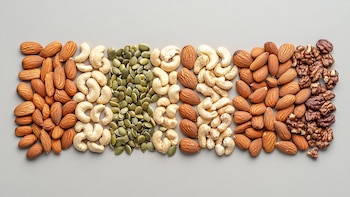





Each September 29 is celebrated on World Heart Daya date intended to raise awareness about the importance of preventing cardiovascular diseases, responsible for millions of deaths around the world.
According to the World Health Organization (WHO), myocardial infarctions and other heart problems cause more than 17 million deaths annually, a figure that is estimated to reach 23 million by 2030.
In Argentina, cardiovascular diseases constitute the main cause of deathwith more than 100,000 lives lost each year.
This scenario, however, can be largely reversed. Adopting healthy habits and following balanced diets, such as the Mediterranean diet, offer an effective way to reduce the risk of suffering from this type of disease.

The Mediterranean dietnative to the countries bordering the Mediterranean Sea, such as Italy and Greeceis based on the abundant consumption of fruits, vegetables, legumes, whole grains, nuts and olive oil.
This eating pattern is characterized by being rich in healthy fatslike those present in olive oil, and therefore limit consumption of animal products. Instead of red meat, the consumption of fish and seafood is prioritized.
Among the main foods of the Mediterranean diet are:
- Olive oil as the main source of fat.
- Fish and seafood rich in omega-3, such as salmon and tuna.
- Fresh fruits and vegetables in abundance.
- Legumes, such as lentils and chickpeas, which provide plant protein.
- Nuts and seeds, which provide healthy fats.
- Red wine in moderation, generally consumed with meals.

Recent studies, such as one published in JAMA Network Openshowed that following the Mediterranean diet for at least eight weeks can significantly reduce blood pressure and cholesterol levelstwo of the main risk factors for heart disease.
This type of diet is also associated with a lower risk of developing type 2 diabetes and neurodegenerative diseases.
The usual consumption of unsaturated fatscoming from olive oil and fish, helps lower LDL cholesterol levels (“bad” cholesterol) and to increase HDL (“good” cholesterol). According to the doctor José Francisco López-Gil, researcher of the University of the Americas In Quito, adopting the Mediterranean diet from childhood can also prevent the appearance of metabolic disorderssuch as hypertension, in later stages of life.

In addition to the Mediterranean diet, other dietary approaches have also been shown to be effective in prevention of cardiovascular diseasesamong them:
- The DASH diet. As an acronym for “Dietary Approaches to Stop Hypertension,” this eating plan was specifically designed to reduce blood pressure. Promotes the consumption of fruits, vegetables, low-fat dairy products, whole grains, and limiting sodium and processed foods.
- The pescetarian diet. This type of feeding exclude red meat and is based on the consumption of fish at least twice a week, combined with vegetables, fruits, eggs and dairy products. Although it is beneficial for heart health, the nutritionist Somi Igbene warned The Telegraph Those who follow it should pay attention to getting enough iron and vitamin B12, nutrients found mainly in meats.
Both diets share principles with the Mediterranean diet, being rich in fiber, low in saturated fat and focused on the consumption of natural and fresh foods, which helps reduce cardiovascular risk.

In addition to following a healthy diet, there are other key habits that can protect cardiovascular health. According to the American Heart Association (AHA) and the Mayo Clinicsome of the most effective changes include:
- Control portion sizes: Overeating, even of healthy foods, can lead to unwanted weight gain. It is important to control the amount consumed, especially in restaurants, where portions are often larger than necessary.
- Limit salt and sodium intake: Excess sodium increases the risk of hypertension, a key factor in heart disease. It is recommended not to consume more than 2,300 mg of sodium per day, and ideally reduce it to 1,500 mg.
- Reduce saturated and trans fats: Saturated fats, found in foods such as red meat and full-fat dairy products, and trans fats, found in processed foods, increase blood cholesterol and the risk of atherosclerosis. It is advisable to replace them with unsaturated fats, such as those in olive oil and fish.
- Stay active: Regular exercise, such as walking, swimming or cycling, strengthens the heart and improves circulation, reducing the risks associated with heart disease.
- Avoid tobacco and excessive alcohol consumption: Smoking damages blood vessels and increases the risk of cardiovascular disease. Moderate consumption of red wine, which is part of the Mediterranean diet, is acceptable, but excessive alcohol can have adverse effects on heart health.
Incorporate these habits and follow a balanced diet may be the key to protecting the heart and reducing the risk of suffering from cardiovascular diseasescontributing to a healthier and longer life.
